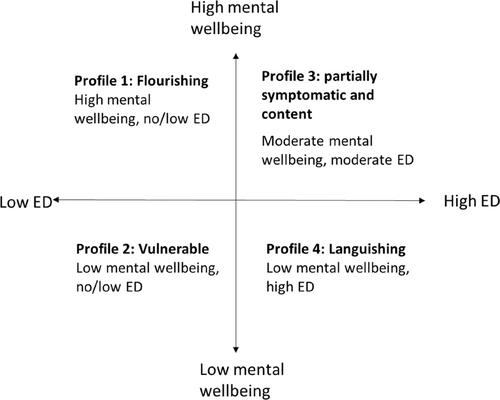进食障碍症状背景下心理健康的双重连续模型的研究
IF 3.8
3区 心理学
Q1 PSYCHOLOGY, CLINICAL
引用次数: 0
摘要
目的心理健康的双连续体模型表明,心理健康和精神疾病是两个不同的连续体,它们对整体心理健康的贡献是相互关联的。本研究探讨进食障碍症状个体的双重连续模式。方法对346名女大学生进行心理健康、饮食失调症状、临床损害和心理困扰等方面的调查。验证性因素和潜在特征分析被用来得出潜在的心理健康特征。结果揭示了代表心理健康和饮食失调症状学结构的两个倾斜因素,并出现了与双连续模型部分一致的四个独特的心理健康概况:“繁荣”,“脆弱”,“部分症状和内容”和“萎靡不振”。衍生的心理健康概况具有独特的特征,描述了心理困扰和临床损害。结论该结果与单维方法的解释方式一致,不能为双连续体模型提供确凿的证据。虽然双连续体模型是一种很有前途的途径,以一种超越症状的方式来理解心理健康,但这些结果警告人们不要迅速采用它,并鼓励未来的研究来了解饮食失调症状学和积极的心理健康资产如何促进整体心理健康。本文章由计算机程序翻译,如有差异,请以英文原文为准。

An investigation of the dual continua model of mental health in the context of eating disorder symptomatology using latent profile analysis
OBJECTIVE The dual continua model of mental health suggests that mental well-being and mental illness are two distinct continua that are interrelated in their contributions to overall mental health. This study investigated the dual continua model in individuals with eating disorder symptoms. METHOD Female university students (N = 346) completed measures of mental well-being, eating disorder symptomatology, clinical impairment and psychological distress. Confirmatory factor and latent profile analyses were used to derive underlying mental health profiles. RESULTS Results revealed two oblique factors representing the mental well-being and eating disorder symptomatology constructs and four unique mental health profiles that were partially consistent with the dual continua model emerged: 'flourishing', 'vulnerable', 'partially symptomatic and content', and 'languishing'. The derived mental health profiles had unique characteristics described by psychological distress and clinical impairment. CONCLUSIONS The results did not provide conclusive evidence for the dual continua model as they could also be interpreted in a manner consistent with the unidimensional approach. While the dual continua model is a promising avenue to understand mental health in a way that looks beyond symptoms, these results caution against its rapid adoption and encourage future research to understand how eating disorder symptomatology and positive mental health assets contribute to overall mental health.
求助全文
通过发布文献求助,成功后即可免费获取论文全文。
去求助
来源期刊

British Journal of Clinical Psychology
PSYCHOLOGY, CLINICAL-
CiteScore
5.80
自引率
3.20%
发文量
57
期刊介绍:
The British Journal of Clinical Psychology publishes original research, both empirical and theoretical, on all aspects of clinical psychology: - clinical and abnormal psychology featuring descriptive or experimental studies - aetiology, assessment and treatment of the whole range of psychological disorders irrespective of age group and setting - biological influences on individual behaviour - studies of psychological interventions and treatment on individuals, dyads, families and groups
 求助内容:
求助内容: 应助结果提醒方式:
应助结果提醒方式:


